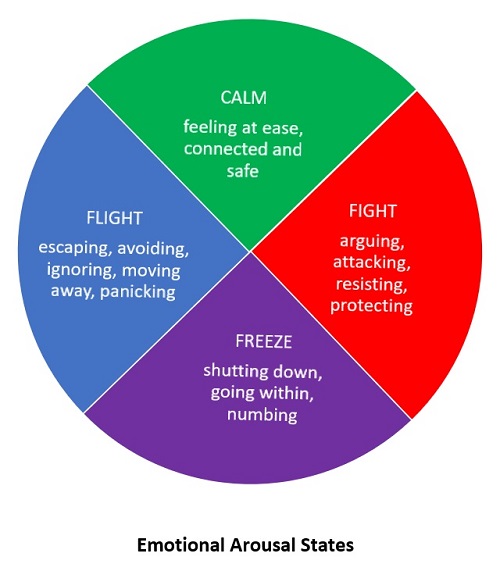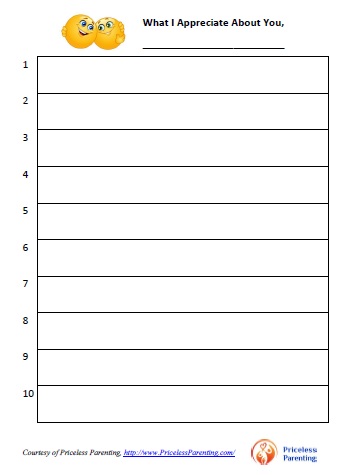Recognizing emotional states is key to good communication. You need to know both your own emotional state and the emotional state of others. This would be a lot easier if people’s emotional states weren’t constantly changing!
Have you ever had a terrible morning because your child became upset over something? Perhaps your child felt rushed, couldn’t find the completed homework or didn’t want to go to school. Situations like these can spiral downwards quickly as tempers flare.
If you don’t recognize your child is not in a calm state, you can accidentally add more stress. It’s especially easy to ignore or misread your child’s emotions if you are not in a calm state yourself.
(finish reading this article on PricelessParenting.com)
Ready for easier parenting in 2020?
Parenting can be a pleasure or a pain. If one of your goals in 2020 is making parenting less stressful and more fun, I hope you’ll join one of Priceless Parenting's classes (ages 0 – 5, 6 – 12 or 13 – 18). The classes now include monthly group coaching calls so you can get your specific questions answered.
Parents who’ve taken Priceless Parenting’s classes report positive changes in their families. Here are a few parent comments about the classes:
"I'm in awe of how well the course is assembled. It was far above my expectations and learned more than I ever realized I would as a parent of 5 kids and been parenting for many years. I never imagined a simple course like this could teach me how wrong my approach to parenting using discipline and anger or frustration has been. It has been a long time since I have laughed and cried at what I have done wrong or right as a parent. I realize a whole new world of positive parenting and guiding my children with options and empathy using patience and love for my children as well as myself." - John Bramlett, Enumclaw, WA
"This parenting class was extremely informative and interesting. I found it easy to understand, and I loved the real-life examples included. I'd recommend this course to anyone. It's truly been helpful to myself and my family!" - Amanda Mullins, Defiance, OH
"It is wonderfully made - very informative and educational. Definitely showed me where my weaknesses are and how to change them to invite a more positive response. The constant struggle caused frustration only to see both of us stressed and frustrated. I like the self-paced program for those of us who do not work a normal set work schedule. It fits in better than weekly in person meetings that are hard to make. Definitely worth the time and money to learn how to communicate and listen to your child while setting clear boundaries." - Brandon Krogh, Newman, CA
If you have any questions about the parenting classes, please email support or call 425-770-1629.
Parents who’ve taken Priceless Parenting’s classes report positive changes in their families. Here are a few parent comments about the classes:
"I'm in awe of how well the course is assembled. It was far above my expectations and learned more than I ever realized I would as a parent of 5 kids and been parenting for many years. I never imagined a simple course like this could teach me how wrong my approach to parenting using discipline and anger or frustration has been. It has been a long time since I have laughed and cried at what I have done wrong or right as a parent. I realize a whole new world of positive parenting and guiding my children with options and empathy using patience and love for my children as well as myself." - John Bramlett, Enumclaw, WA
"This parenting class was extremely informative and interesting. I found it easy to understand, and I loved the real-life examples included. I'd recommend this course to anyone. It's truly been helpful to myself and my family!" - Amanda Mullins, Defiance, OH
"It is wonderfully made - very informative and educational. Definitely showed me where my weaknesses are and how to change them to invite a more positive response. The constant struggle caused frustration only to see both of us stressed and frustrated. I like the self-paced program for those of us who do not work a normal set work schedule. It fits in better than weekly in person meetings that are hard to make. Definitely worth the time and money to learn how to communicate and listen to your child while setting clear boundaries." - Brandon Krogh, Newman, CA
If you have any questions about the parenting classes, please email support or call 425-770-1629.
Expressing Love, Gratitude and Forgiveness
What four things matter the most in parenting? Might they be the same as the four things that matter most in life? It’s likely since your relationships with your children are among the most significant ones in your life.
The Four Things That Matter Most
Dr. Ira Byock, an international leader in palliative care, has witnessed many people’s final days. He’s captured the valuable things he’s learned from the dying in his book, The Four Things That Matter Most: A Book About Living.
Byock noticed many who are dying have a strong desire to repair relationship rifts with their loved ones. Repairing their relationships allows them to die in a more peaceful state. He learned that these four statements were the crucial ones to communicate:
(finish reading at PricelessParenting.com)
The Four Things That Matter Most
Dr. Ira Byock, an international leader in palliative care, has witnessed many people’s final days. He’s captured the valuable things he’s learned from the dying in his book, The Four Things That Matter Most: A Book About Living.
Byock noticed many who are dying have a strong desire to repair relationship rifts with their loved ones. Repairing their relationships allows them to die in a more peaceful state. He learned that these four statements were the crucial ones to communicate:
(finish reading at PricelessParenting.com)
Evaluating Risks and Heeding Warnings
Taking risks is part of living. Your kids need to be able to take reasonable risks to learn and grow. For example, your children would never learn to walk if they weren’t able to risk falling.
Since you can’t keep your kids in some sort of safety bubble, what can you do to help prevent them from being hurt? You can help them think through likely consequences of their choices.
By forewarning your kids, you prepare them. When they are young, you warn them about everything from not touching a hot stove to never getting in a car with a stranger. When they are older you warn them about not drinking and driving. You love them and are trying to protect them from danger. However, it’s up to them to decide if they will heed your warnings.
Giving Warnings
Your kids will sometimes ignore your warnings and learn from the results. They might not hold on tightly to their helium balloon and it sails away. Perhaps they decide to play video games instead of study for a test and get a poor grade. These are natural consequences of their choices. They learn from experiencing these consequences … although some kids will need lots of examples!
How about when the consequences are bigger? Regular conversations involving true stories can help. Your local newspaper is an excellent source of stories about kids facing serious consequences.
(finish reading at PricelessParenting.com)
Since you can’t keep your kids in some sort of safety bubble, what can you do to help prevent them from being hurt? You can help them think through likely consequences of their choices.
By forewarning your kids, you prepare them. When they are young, you warn them about everything from not touching a hot stove to never getting in a car with a stranger. When they are older you warn them about not drinking and driving. You love them and are trying to protect them from danger. However, it’s up to them to decide if they will heed your warnings.
Giving Warnings
Your kids will sometimes ignore your warnings and learn from the results. They might not hold on tightly to their helium balloon and it sails away. Perhaps they decide to play video games instead of study for a test and get a poor grade. These are natural consequences of their choices. They learn from experiencing these consequences … although some kids will need lots of examples!
How about when the consequences are bigger? Regular conversations involving true stories can help. Your local newspaper is an excellent source of stories about kids facing serious consequences.
(finish reading at PricelessParenting.com)
Fueling Good Versus Evil
Everyone is capable of both good and evil behavior. Even when doing something bad or evil, people often justify their behavior with some supposedly good reason. This allows them to maintain their good self-image.
There are many stories of someone committing murder who you’d least expect to do this. When the news reporters interview the neighbors or family members, they express shock and bewilderment. They did not believe this person was capable of murdering. Time and time again there is dismay when good people do evil things.
Acknowledging the Potential for Good and Evil
Everyone is capable of incredibly loving behavior and devastatingly cruel behavior. How do you teach your children about tipping the scale towards good rather than evil?
(Finish reading this article on PricelessParenting.com)
There are many stories of someone committing murder who you’d least expect to do this. When the news reporters interview the neighbors or family members, they express shock and bewilderment. They did not believe this person was capable of murdering. Time and time again there is dismay when good people do evil things.
Acknowledging the Potential for Good and Evil
Everyone is capable of incredibly loving behavior and devastatingly cruel behavior. How do you teach your children about tipping the scale towards good rather than evil?
(Finish reading this article on PricelessParenting.com)
Teaching Kids Heartfelt Apologies
Do you remember hearing someone give an inauthentic apology? Perhaps it was the tone of their voice or the fact they tried to shift the blame to someone else. This type of apology makes the situation worse, not better.
Heartfelt apologies express true regret along with a desire to make amends. Authentic apologies strengthen relationships and build trust. Learning how to give heartfelt apologies is an important skill for your kids to develop.
Learning to Make Amends for Mistakes
What do you do when your child’s behavior causes another child to become upset? Many young children find themselves in this situation after grabbing a toy away from another child. Do you intervene by handing the toy back to the child who had it first? Do you tell your child “Say you are sorry”?
These are your child’s earliest lessons in how to make amends for mistakes. If you force your child to say “I’m sorry” when they really are not sorry, you are teaching them how to suppress their true feelings and lie.
(finish reading the article on PricelessParenting.com)
Heartfelt apologies express true regret along with a desire to make amends. Authentic apologies strengthen relationships and build trust. Learning how to give heartfelt apologies is an important skill for your kids to develop.
Learning to Make Amends for Mistakes
What do you do when your child’s behavior causes another child to become upset? Many young children find themselves in this situation after grabbing a toy away from another child. Do you intervene by handing the toy back to the child who had it first? Do you tell your child “Say you are sorry”?
These are your child’s earliest lessons in how to make amends for mistakes. If you force your child to say “I’m sorry” when they really are not sorry, you are teaching them how to suppress their true feelings and lie.
(finish reading the article on PricelessParenting.com)
Developing Habits to Succeed in School
Can developing good habits help your kids succeed in school? Yes! Habits are powerful patterns of behavior that automatically unfold in certain situations. By establishing helpful habits, your kids will have routines that support them succeeding in school.
The brain loves to establish habits because it takes less thinking and energy. For example, when your children are learning something like how to tie their shoes or drive a car, it will take all their focus to accomplish the task. Once they master it, their brains will use far less energy as the process becomes automatic.
The problem is that your child's brain is just as happy to establish healthy habits as unhealthy ones. Establishing the habit of either having cookies for snack or vegetables with dip is equally appealing to your child's brain. Given how powerful habits are, it is worth figuring out which ones will help your kids succeed in school.
(finish reading article on PricelessParenting.com)
The brain loves to establish habits because it takes less thinking and energy. For example, when your children are learning something like how to tie their shoes or drive a car, it will take all their focus to accomplish the task. Once they master it, their brains will use far less energy as the process becomes automatic.
The problem is that your child's brain is just as happy to establish healthy habits as unhealthy ones. Establishing the habit of either having cookies for snack or vegetables with dip is equally appealing to your child's brain. Given how powerful habits are, it is worth figuring out which ones will help your kids succeed in school.
(finish reading article on PricelessParenting.com)
Subscribe to:
Posts (Atom)
Are your kids being targeted for sextortion?
Scammers are targeting kids for sextortion. They convince kids that nude pictures of them will be distributed to family, friends, classmate...

-
The word 'yet' can be incredibly powerful. If your child says, "I can't do this," add the word 'yet' to the en...
-
Susán Hoemke dreamt of a perfect family - a loving husband and four beautiful children. When their oldest son, Hayden, became addicted...
-
Is your teen presenting extremely challenging behavior? If you feel overwhelmed and unsure of how to help your teen, getting professional h...






